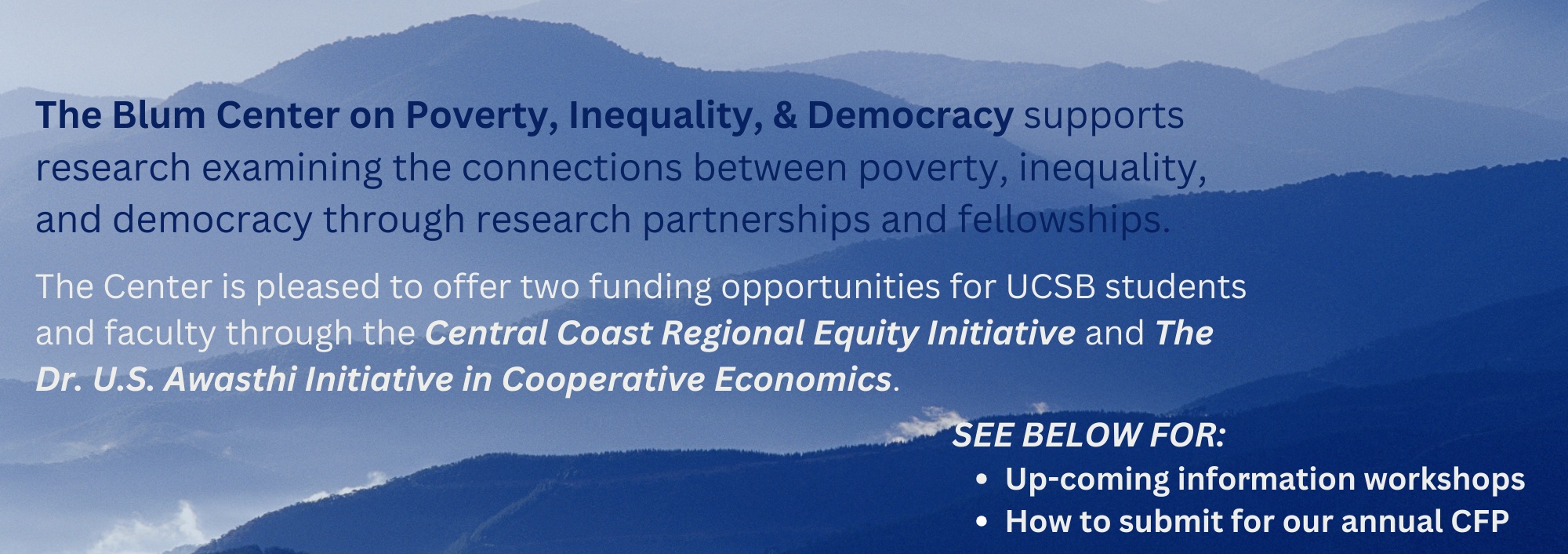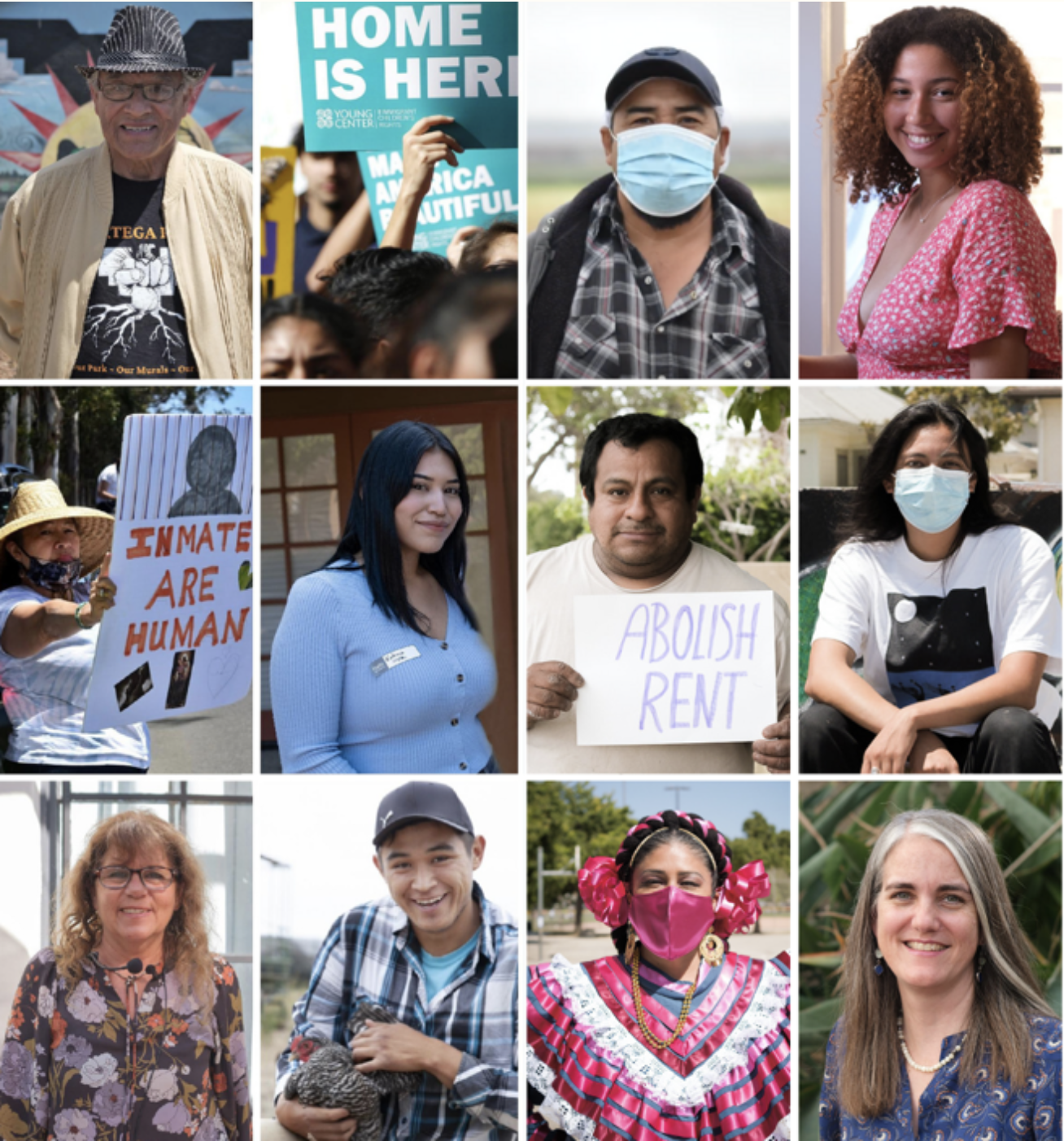2026 Call for Proposals: Undergraduate, Graduate, & Faculty Research
The UCSB Blum Center invites proposals for student research in the area of cooperative economics, as part of the Dr. U.S. Awasthi Initiative in Cooperative Economics. The Initiative aims to promote scholarly and public understanding of the principles, practices, and prospects for cooperative enterprise on the Central Coast of California, in the U.S. and worldwide.
Cooperative economics encompasses a broad spectrum of collaborative endeavors, from the communal practices and empowerment strategies of indigenous communities to the support and exchange networks developed within the contemporary mutual aid movement. It is also the basis of a vast field of formally established cooperative enterprises. These are organizations owned and democratically controlled by associations of people who come together to meet their shared economic needs in ways that contribute to community and social well-being. Cooperatives of varied size and scale have come to play a significant role as operators of grocery stores, housing communities, financial institutions, and worker-owned companies, as well as in agricultural production. They are based on values of democracy, equity, accountability, and self-help, and prioritize the needs of members over the maximization of profit. There is a rich tradition of cooperative endeavor in movements for racial and intersectional justice.
We encourage proposals that explore cooperative economics from a variety of disciplinary perspectives, and focus on topics related to the establishment, operation, and sustainability of cooperative enterprises, the cultural and political contexts within which cooperative economic arrangements have been pursued, and whether and how cooperatives have contributed to the well-being of the communities they serve. We also welcome proposals that center racial and intersectional justice. Funding is available for undergraduate and graduate student research projects as well as for faculty-directed research that employs undergraduate and/or graduate student research assistants.
Budgets and Allowable Expenses
Undergraduate and graduate students may request up to $2,000 to support original research projects. Eligible expenses include costs related to original data collection, field work, or archival research; software and/or small equipment required for the proposed research; data acquisition; transcription; and research supplies. Grant funds may not be used for the costs of tuition, fees, or insurance; student salaries; participation in conferences or trainings; or non-expendable equipment. Proposals for individual grants must be accompanied by a letter of support from the student's faculty mentor or graduate advisor. If your project involves human subjects, please be sure that you are in compliance with University guidelines, including Institutional Review Board approval.
Faculty may request up to $4,000 to support the costs of employing undergraduate and/or graduate students as research assistants in ways that facilitate student participation and provide mentorship in research related to cooperative economics.
Timetable and Research Symposium
The grant period for these awards is July 1, 2026 – June 30, 2027. Funds will be provided in the form of authorized direct payment and/or reimbursement of allowable expenses with appropriate receipts. Award recipients will present their research at the Third Annual Blum Center Cooperative Economics Research Symposium in Spring 2027.
Please use this link to view the list of current award recipients and learn more about their respective projects.
Eligibility
UCSB faculty, graduate, and undergraduate students are eligible to apply. Undergraduate and graduate student applicants must be registered at UCSB at the time of application and for the duration of the project. Student proposals must be accompanied by a letter of recommendation from the student's faculty mentor or graduate advisor. The letter should be emailed to Assistant Director Dr. Kashia Arnold at karnold@ucsb.edu.
Required Application Materials
Applicants must submit the following materials as a single PDF:
- Brief project description (maximum 1,250 words) discussing the project's objectives, central research questions, approach and methodology, contributions and outcomes, and relevance to the themes outlined in this call
- Detailed budget
- Curriculum vitae (no longer than 2 pages)
- Letter of reference from the applicant's faculty graduate advisor indicating support for the proposed research (graduate students only)
- Verification of IRB approval or pending approval (if required)
Zoom Information Session
![]() Monday, February 9th, 2026 from 1:00–2:00 PM
Monday, February 9th, 2026 from 1:00–2:00 PM
Submit Your Application
Submit Application via Google Form
Undergraduate and graduate student letters of reference should be emailed separately to Assistant Director Dr. Kashia Arnold at karnold@ucsb.edu.
Questions?
Please contact Cooperative Economics GSA Şeyma Özdemir at sozdemir@ucsb.edu.
2026 Call for Proposals: Graduate & Faculty Research
The UCSB Blum Center invites proposals for faculty and graduate student research on inequality in the Central Coast region of California, here encompassing Santa Barbara, San Luis Obispo, and Ventura Counties. Projects selected for funding will contribute to the Central Coast Regional Equity Initiative, a collaborative project co-sponsored by the Blum Center and The Fund for Santa Barbara that promotes community-engaged research, policy analysis, and collective action to advance social, economic, health, environmental, and civic equity and justice in the region. Further information on the Initiative can be found by consulting the Executive Summary of the 2021 Central Coast Regional Equity Study and our recent report Equity Matters 2024.
We encourage proposals that explore equity from a variety of disciplinary (or interdisciplinary) perspectives, that address disparities across a broad range of indicators, including employment and wages, education, health, housing, climate risk, and political representation, and that foreground social justice, including (but not limited to) research on regional issues with disparate impacts by race, class, gender, indigeneity, and citizenship status. We also encourage proposals that involve collaboration with community partners. Research may focus on the causes, dimensions, consequences, and/or responses to inequality in the Central Coast.
Research may span the three target counties or be located within a single county. Funds may also be used to develop a Central Coast regional component of an existing project that includes a broader geographic area. All proposals must specify how community engagement is part of the research design, dissemination, and outcome of the project that will be funded. Possible outcomes of funded research include academic publications, dissertation chapters, public-facing reports, new public data sets, and ongoing campus/community research collaborations.
Budgets and Allowable Expenses
Applicants may request up to $5,000 to support original research projects but may be funded for less than the requested amount, depending on the number and range of applicants. All budget requests must be fully justified. Eligible expenses include costs related to original data collection, field work, or archival research; software and/or small equipment required for the proposed research; data acquisition; transcription; and research supplies. Graduate students may apply for up to $3,500 in summer stipend support as part of their total award request. Award funds may not be used for the costs of tuition, fees, or insurance; replacement salary; participation in conferences or trainings; or non-expendable equipment. Proposals from faculty may request funding to support the costs of employing undergraduate and/or graduate students as research assistants (GSRs). If your project involves human subjects, please be sure that you are in compliance with University guidelines, including Institutional Review Board approval.
Applications will be reviewed by an interdisciplinary faculty panel and will be awarded based on the quality of the proposal, relevance to regional equity, degree of community engagement, and appropriateness of the budget.
Timetable and Research Symposium
The grant period for these awards is July 1, 2026 – June 30, 2027. Award recipients will present their research at a symposium hosted by the UCSB Blum Center in Spring 2027. To review our current CCREI Awardees and their projects, please use this link.
Eligibility
UCSB faculty and graduate students are eligible to apply. Graduate student applicants must be registered at UCSB at the time of application and for the duration of the project. Student proposals must be accompanied by a letter of recommendation from the student's faculty mentor or graduate advisor. The letter should be emailed to Blum Center Assistant Director Dr. Kashia Arnold at karnold@ucsb.edu.
Required Application Materials
Applicants must submit the following materials as a single PDF:
- Brief project description (maximum 1,250 words) discussing the project's objectives, central research questions, approach and methodology, contributions and outcomes, and relevance to the themes outlined in this call
- Detailed budget
- Curriculum vitae (no longer than 2 pages)
- Letter of reference from the applicant's faculty graduate advisor indicating support for the proposed research (graduate students only)
- Verification of IRB approval or pending approval (if required)
Zoom Information Session
![]() Wednesday, February 11th, 2026 from 1:00–2:00 PM
Wednesday, February 11th, 2026 from 1:00–2:00 PM
Submit Your Application
Submit Application via Google Form
Graduate student letters of reference should be emailed separately to Blum Center Assistant Director Dr. Kashia Arnold at karnold@ucsb.edu.
Questions?
Please contact Equity Research Postdoctoral Scholar Dr. Abby Cunniff at aecunniff@ucsb.edu.



